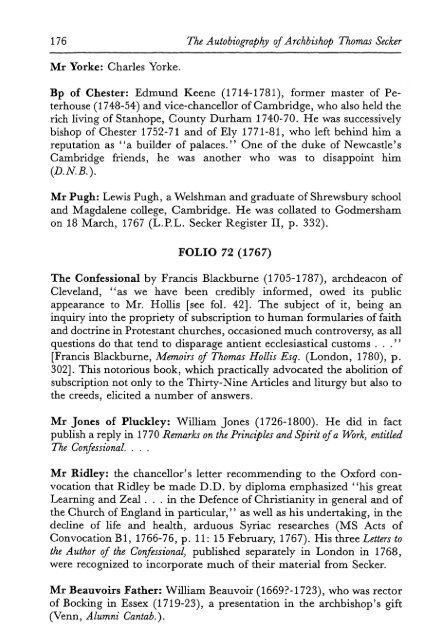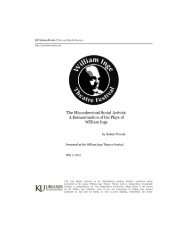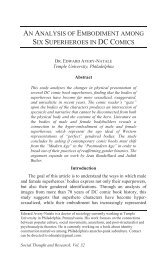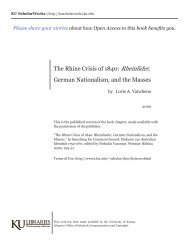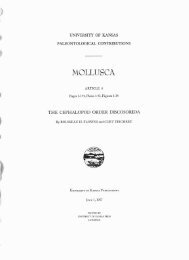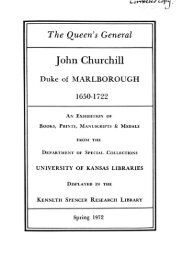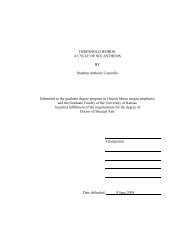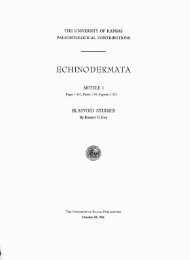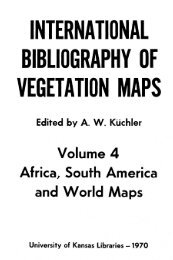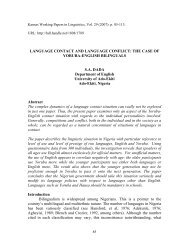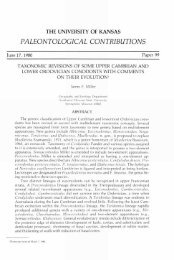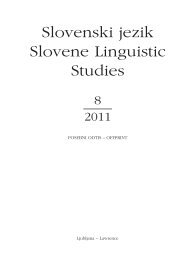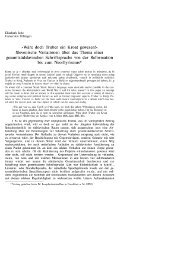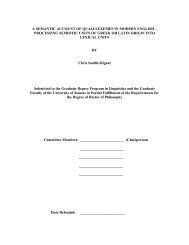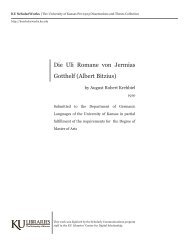Archbishop of Canterbury - KU ScholarWorks - The University of ...
Archbishop of Canterbury - KU ScholarWorks - The University of ...
Archbishop of Canterbury - KU ScholarWorks - The University of ...
You also want an ePaper? Increase the reach of your titles
YUMPU automatically turns print PDFs into web optimized ePapers that Google loves.
176 <strong>The</strong> Autobiography <strong>of</strong> <strong>Archbishop</strong> Thomas Seeker<br />
Mr Yorke: Charles Yorke.<br />
Bp <strong>of</strong> Chester: Edmund Keene (1714-1781), former master <strong>of</strong> Peterhouse<br />
(1748-54) and vice-chancellor <strong>of</strong> Cambridge, who also held the<br />
rich living <strong>of</strong> Stanhope, County Durham 1740-70. He was successively<br />
bishop <strong>of</strong> Chester 1752-71 and <strong>of</strong> Ely 1771-81, who left behind him a<br />
reputation as "a builder <strong>of</strong> palaces." One <strong>of</strong> the duke <strong>of</strong> Newcastle's<br />
Cambridge friends, he was another who was to disappoint him<br />
(D.N.B.).<br />
Mr Pugh: Lewis Pugh, a Welshman and graduate <strong>of</strong> Shrewsbury school<br />
and Magdalene college, Cambridge. He was collated to Godmersham<br />
on 18 March, 1767 (L.P.L. Seeker Register II, p. 332).<br />
FOLIO 72 (1767)<br />
<strong>The</strong> Confessional by Francis Blackburne (1705-1787), archdeacon <strong>of</strong><br />
Cleveland, "as we have been credibly informed, owed its public<br />
appearance to Mr. Hollis [see fol. 42]. <strong>The</strong> subject <strong>of</strong> it, being an<br />
inquiry into the propriety <strong>of</strong> subscription to human formularies <strong>of</strong> faith<br />
and doctrine in Protestant churches, occasioned much controversy, as all<br />
questions do that tend to disparage antient ecclesiastical customs ..."<br />
[Francis Blackburne, Memoirs <strong>of</strong> Thomas Hollis Esq. (London, 1780), p.<br />
302]. This notorious book, which practically advocated the abolition <strong>of</strong><br />
subscription not only to the Thirty-Nine Articles and liturgy but also to<br />
the creeds, elicited a number <strong>of</strong> answers.<br />
Mr Jones <strong>of</strong> Pluckley: William Jones (1726-1800). He did in fact<br />
publish a reply in 1770 Remarks on the Principles and Spirit <strong>of</strong> a Work, entitled<br />
<strong>The</strong> Confessional. . . .<br />
Mr Ridley: the chancellor's letter recommending to the Oxford convocation<br />
that Ridley be made D.D. by diploma emphasized "his great<br />
Learning and Zeal ... in the Defence <strong>of</strong> Christianity in general and <strong>of</strong><br />
the Church <strong>of</strong> England in particular," as well as his undertaking, in the<br />
decline <strong>of</strong> life and health, arduous Syriac researches (MS Acts <strong>of</strong><br />
Convocation Bl, 1766-76, p. 11: 15 February, 1767). His three Letters to<br />
the Author <strong>of</strong> the Confessional, published separately in London in 1768,<br />
were recognized to incorporate much <strong>of</strong> their material from Seeker.<br />
Mr Beauvoirs Father: William Beauvoir (1669?-1723), who was rector<br />
<strong>of</strong> Booking in Essex (1719-23), a presentation in the archbishop's gift<br />
(Venn, Alumni Cantab.).


